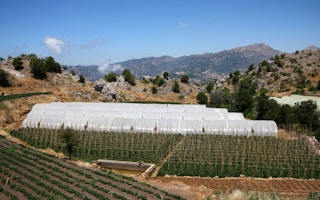The negative effects of climate change are already beginning to be felt in every part of the world and yet countries are ill-prepared for the potentially immense impacts on food security, water supplies and human health, a major report has concluded.
In the most comprehensive study yet into the effects of rising levels of carbon dioxide in the atmosphere, the UN’s Intergovernmental Panel on Climate Change (IPCC) warns that global warming could undermine economic growth and increase poverty.
The IPCC found that the negative impacts of climate change have already extended beyond any potential benefits of rising temperatures and that they will worsen if global-average temperatures continue to rise by the expected lower limit of 2C by 2100 – and will become potentially catastrophic if temperatures rise higher than 4C.
In a blunt and often pessimistic assessment of climate-change impacts – the fifth assessment since 1990 – the IPCC scientists give a stark warning about what the world should expect if global temperatures continue to rise as predicted without mitigation or adaptation.
“
There are a few places where there are a few benefits of warming but there are many other places where there are widespread negative impacts
Christopher Field, Carnegie Institution’s Department of Global Ecology in California and co-chair of IPCC working group II
“In recent decades, changes in climate have caused impacts on natural and human systems on all continents and across the oceans,” says the report Climate Change 2014 Impacts, Adaptation and Vulnerability, formally released early this morning by the IPCC after a final editorial meeting in Yokohama, Japan.
“Throughout the 21st century, climate-change impacts are projected to slow down economic growth, make poverty more difficult, further erode food security, and prolong existing and create new poverty traps, the latter particularly in urban areas and emerging hot spots of hunger,” the report states.
Scientists in Britain said it is the clearest warning yet of what could happen if the world continues to prevaricate over cuts in emissions. “Climate change is happening, there are big risks for everyone and no place in the world is immune from them,” said Professor Neil Adger of Exeter University, one of the many lead authors of the report.
Nearly 2,000 experts from around the world contributed to the report, written by 436 authors and edited by 309 lead authors and review editors of the IPCC’s working group II. It was by far the most detailed investigation to date of the global impacts of climate change – extending from oceans to mountains and from the poles to the equator.
Christopher Field, of the Carnegie Institution’s Department of Global Ecology in California and co-chair of working group II, said that the observed impacts of climate change are already widespread and that “we’re not talking about hypothetical events”.
The much-touted benefits of climate change – such as the ability to grow some crops such as vineyards at higher northerly latitudes – dwindle into insignificance compared to the enormous challenges produced by the much bigger downsides of a warmer and more stressed world, the report suggests.
“It is true that we can’t find many benefits of climate change and I believe it’s because there aren’t many benefits, even though we tried really hard to find them,” Dr Field said. “There are a few places where there are a few benefits of warming but there are many other places where there are widespread negative impacts,” he said.
The evidence for climate-change impacts is the strongest and most comprehensive for natural systems, such as melting mountain glaciers and polar ice, and the earlier and earlier signs of spring. However, impacts on human systems, such as a rise in certain tropical diseases, can also be attributed to climate change.
“We live in an era of man-made climate change. In many cases, we are not prepared for the climate-related risks that we already face,” said Vicente Barros, co-chair of the IPCC working group II.
Read more here about the climate-related impacts studied by the IPCC.










